By BEN BRANSTETTER
With the news about PRISM breaking this month, we all now know that to some extent, we are being watched. Yes, you. Probably right now. Corporations are flooding your online habits with traffic-following cookies. They know you’re reading this. I’m using Google Drive to write this, so they definitely know I’m writing this—my Gmail currently has ads for online privacy programs and petitions for libertarian causes. And it isn’t just “for our protection”: the data collection of the NSA is “trickling” down to credit agencies and lenders.
These are no longer the paranoid ramblings of basement-dwellers but the true, hard facts about modern society. We are watched by the walls of server farms and the cold, stringent web of fiber optic cables. Soon, with the impending release of Google Glass, we all will be the watchers, too. The big question now hanging over our heads isn’t “why.” It’s, “so what?”
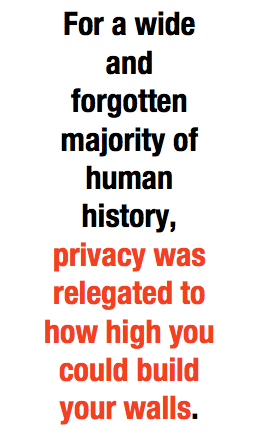 For a wide and forgotten majority of human history, privacy was relegated to how high you could build your walls. Even within those walls, there frankly wasn’t much. Privacy is an idea that emerged in a particular historical moment, and once had a heydey. As the structure of anonymity in modern life comes tumbling down to marketers, the NSA, and your own friends—have we spoiled ourselves on riches of our past life? Maybe privacy is an idea that’s had it’s moment in the sun, and we just need to get used to the shade.
For a wide and forgotten majority of human history, privacy was relegated to how high you could build your walls. Even within those walls, there frankly wasn’t much. Privacy is an idea that emerged in a particular historical moment, and once had a heydey. As the structure of anonymity in modern life comes tumbling down to marketers, the NSA, and your own friends—have we spoiled ourselves on riches of our past life? Maybe privacy is an idea that’s had it’s moment in the sun, and we just need to get used to the shade.
The Internet is the tool that has made this collapse of privacy possible. Once we are concealed within the mass populations of cities and even suburbs, we become immediately harder to follow and observe. Before this era of trackable communication, one could hide even the darkest of habits in the steaming pile of early city life.
The idea of privacy as something we are all entitled to didn’t always exist, and nor, perhaps, will it. There’s a narrative about the so-called ‘Age of Privacy’ which could be said to have started with this beginning of intense urbanization during the 19th century—whereby those illicit habits could be hid more easily, in the depths of a city, among a larger population. Before that, the mere fact that hamlets were the main sources of population meant secrets were harder to conceal, simply because one in 200 stands out more than 1 in 2 million.
Has the narrative of privacy in fact now ended with the invention of social media? Because the Internet organizes the social chaos brought on by an exponential population growth, it’s making privacy more scarce than it has been since humans all lived within walking distance of their family members.
***
The dawn of major cities presented many difficult problems for governments looking to maintain order and protect their populace. Napoleon I noted this problem in 1801, in Paris, the largest city in Europe and—not coincidentally—the most crime-ridden. The emperor enlisted the first organization we would recognize as a modern police force, complete with arrests and regular patrols. Similar forces would pop up during the 19th century throughout the US, starting in Boston, New York, and Philadelphia. In fact, Police Commissioner of the NYPD Theodore Roosevelt was the first to decree the police should carry pistols, more than fifty years after the founding of the department. But why were these forces not yet necessary in rural areas?
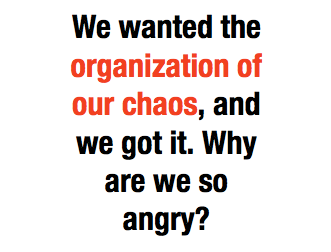 During the colonial period in the US and for some time thereafter, towns were self-observed. “Night watches”or even vigilante “posses” consisted of armed and unarmed civilians roaming their local streets to keep an eye out for criminal activity or even fires. Towns were small enough that no professional expertise was necessary to spot and solve crimes; merely a quick understanding of the area.
During the colonial period in the US and for some time thereafter, towns were self-observed. “Night watches”or even vigilante “posses” consisted of armed and unarmed civilians roaming their local streets to keep an eye out for criminal activity or even fires. Towns were small enough that no professional expertise was necessary to spot and solve crimes; merely a quick understanding of the area.
Cities, meanwhile, spent the 19th century becoming harder and harder to govern. Brothels and gambling clubs subverted the law in major cities as did gangs and corrupters of political office, mostly due to the unfamiliarity that came with the million plus people crammed into a relatively small geographical location.
As the 20th century quickly approached, police departments began to find ways to tackle the seemingly impossible problem of surveillance—and with it questions of morality and privacy. In 1879, an Argentinian police officer opened the first fingerprinting system, collecting and storing the prints of thousands of known criminals. Suddenly, one clear and distinct method of sorting through the clutter had arrived.
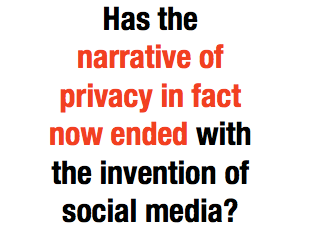 As print media and photography came into popularity, and new ways of documenting the clutter emerged, new questions about privacy were consistently raised. The phrase “right to privacy” was coined in 1890 by a Harvard Law Review paper of the same name, by Samuel Warren and Louis Brandeis. At this time, as changes in print technology and the very nature of papers emerged (lest we forget, this was beginning of “yellow journalism”), the invasiveness feared was actually not at the hand of governments—it was at the scrawled fingers of the press.
As print media and photography came into popularity, and new ways of documenting the clutter emerged, new questions about privacy were consistently raised. The phrase “right to privacy” was coined in 1890 by a Harvard Law Review paper of the same name, by Samuel Warren and Louis Brandeis. At this time, as changes in print technology and the very nature of papers emerged (lest we forget, this was beginning of “yellow journalism”), the invasiveness feared was actually not at the hand of governments—it was at the scrawled fingers of the press.
For most of American history, privacy was handled under English Common Law assessments of trespassing. However, as the recording of images became possible, “gossip is no longer the resource of the idle and of the vicious,” wrote Warren and Brandeis, “but has become a trade…To satisfy a prurient taste the details of sexual relations are spread broadcast in the columns of the daily papers. To occupy the indolent, column upon column is filled with idle gossip, which can only be procured by intrusion upon the domestic circle.” As Jill Lepore puts it in a recent New Yorker column,
“Privacy, they argued, hadn’t always been necessary; it had become necessary—because of the shifting meaning and nature of publicity….Warren and Brandeis believed that the violation of the right to privacy constitutes a kind of wound—a puncturing of the soul—that might, finally, deaden our minds.”
We in the TMZ-age would recognize this as tabloid culture. A recent documentary, Sellebrity, focused on the harm wrought upon the lives of celebrities (in particular Princess Diana) by an overbearing press core, feeding that “prurient taste” Warren and Brandeis wrote about nearly a century ago. As the 20th century loomed large, fears of privacy centered on the newfangled men behind the newfangled camera.
However, the camera can only see what the eye can see. It’s the reason Google can take a photo of your house for their Street View service but cannot collect information from your WiFi signal (something which forced them into a paltry $7 million lawsuit settlement with 38 US states).
***
At this point we have come to a widespread understanding of privacy as anything which cannot be seen from a public standpoint with certain limited technology. Our right to privacy hinges on our widespread “expectation” of privacy. A program like PRISM attempts to open that door far wider than it has ever been before. As Lepore writes,
As a matter of historical analysis, the relationship between secrecy and privacy can be stated in an axiom: the defense of privacy follows, and never precedes, the emergence of new technologies for the exposure of secrets. In other words, the case for privacy always comes too late. The horse is out of the barn. The post office has opened your mail. Your photograph is on Facebook. Google already knows that, notwithstanding your demographic, you hate kale.
But at what point is it, exactly, that a technology becomes popular enough to allow the average person to assume it is in constant use? CCTV cameras are not considered an invasion of privacy for just that reason (plus they’re used in a public space). In 2001, the Supreme Court set a dangerous standard for measuring privacy in Kyllo v. United States. The question at hand was whether thermal imaging cameras could be lawfully used by police and investigators to find pot farms in people’s homes. Justice Scalia found this technology to be an invasion of privacy—as it went past the front door of people’s homes and was not a widely-available technology.
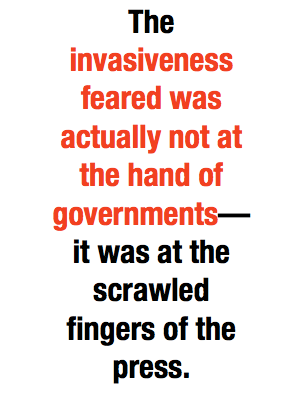 Now that any hunter spotting doe in the early dawn of morning can find heat vision goggles, are the police allowed to use them to spy on possible drug dealers? Scalia, writing for the majority, stated, “while the technology used in the present case was relatively crude, the rule we must adopt must take account of more sophisticated systems that are already in use or in development.”
Now that any hunter spotting doe in the early dawn of morning can find heat vision goggles, are the police allowed to use them to spy on possible drug dealers? Scalia, writing for the majority, stated, “while the technology used in the present case was relatively crude, the rule we must adopt must take account of more sophisticated systems that are already in use or in development.”
Notice the definition of privacy hinges not on the availability of the technology but the widespread knowledge of the technology’s existence. By either definition, the Internet and social media are thereby perfectly legal ways to obtain information.
***
The advent of the Internet introduced an organizing tool unlike any the world has ever seen. Publicly available information on Facebook helps police capture even petty thieves (especially those dumb enough to use the platform to brag about their misdeeds). Facial recognition technology tags mass crowds of people to their online identities, just like our spotlight shone on Adam in the mass of an anthill. The chaos of cities which once allowed anyone to hide beneath the safety of numbers is now coming to an end.
What’s so astonishing about the “end of privacy” isn’t, in fact, that it is ending. It’s how much information law enforcement agencies are able to gather from private market sources. We understand why Verizon or AT&T keep detailed logs of our calls, and we seem to hold unanimous belief both Google and Facebook would only use our information for relatively harmless advertising gimmicks. We willingly have handed in the details of our entire lives—a “Timeline”—to companies barely a decade old. We wanted the organization of our chaos, and we got it. Why are we so angry?
No one minds a breach of privacy until it does actual harm. When news of mass collections of phone data by the NSA were first unveiled in 2006, a solid majority of Americans found it perfectly acceptable: a Washington Post-Pew Research Center polling found 56% of Americans are okay with PRISM.
***
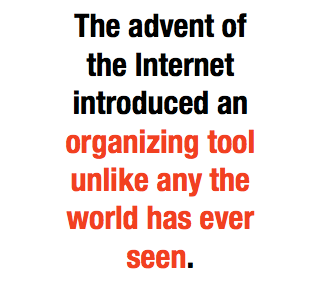
Maybe, in the face of a ghostly enemy and the modern fear of strangers, it is okay to see the Age of Privacy in the rear view mirror, gone to dust with the Age of Colonialism and the Age of Empires. Like colonies and empires, privacy can never truly die. There will always be pockets and holes in our lives that only we know about; some websites will always fight the likes of the NSA. 86 tech companies, including Reddit, 4chan, and Mozilla, have petitioned Congress to end PRISM (although I’d like to remind Redditors that if you used a Gmail or Hotmail account to verify your Reddit account, then the NSA can find you on Reddit, too). But wandering down to your local coffee shop without raising much interest will soon no longer be a possibility.
Smart billboards are popping up in high end malls and the streets of major cities, linking your face to your Facebook and selling you products it hopes you’ll want—Kraft Foods is busy creating a similar program with Facebook itself. Facial recognition technology combined with Facebook will allow authorities to find you in a store, on a busy street, or even in a massive ballpark. George Orwell may have predicted Big Brother, but he never considered it’d be voluntary. We have cheerily signed up for that tracking beam pointed at us. The Age of Privacy was not killed by an overbearing government or a zealous security agency, nor was it killed by those who threaten us and our country’s well-being. It was killed by each and every one of us, a million ants biting away until the giant falls.
Perhaps these are necessary facts. After all, the right of privacy extends to all. When we hear reports about the Tsarnaev brothers being caught on CCTV, we feel better. When we hear national security experts discuss “chatter” amongst terror networks, we take comfort that someone is keeping an eye out. We love Youtube’s “Suggested Videos” and clip coupons sent by department stores through micromarketing. This is not to say what the NSA or major corporations has done is morally prudent or even the correct approach, but rather that we have freely given the watchers the tools necessary to watch. We are just as guilty as the late 19th-century tabloid reader, funding the invasion of gossip rags and debilitating our expectations for generations to come all because we wanted to. We have ended the Age of Privacy ourselves.
Ben Branstetter is a writer and blogger living in Central PA. He attended the Milton Hershey School and studied Secondary Education at Penn State University. His work has been published in Thought Catalog, The Useless Critic, God of Lamb, and he has appeared on HuffPo Live. He can be reached by email atbranstetterb@gmail.com and found on Twitter @BenBranstetter.
Illustration by Jason Reed


